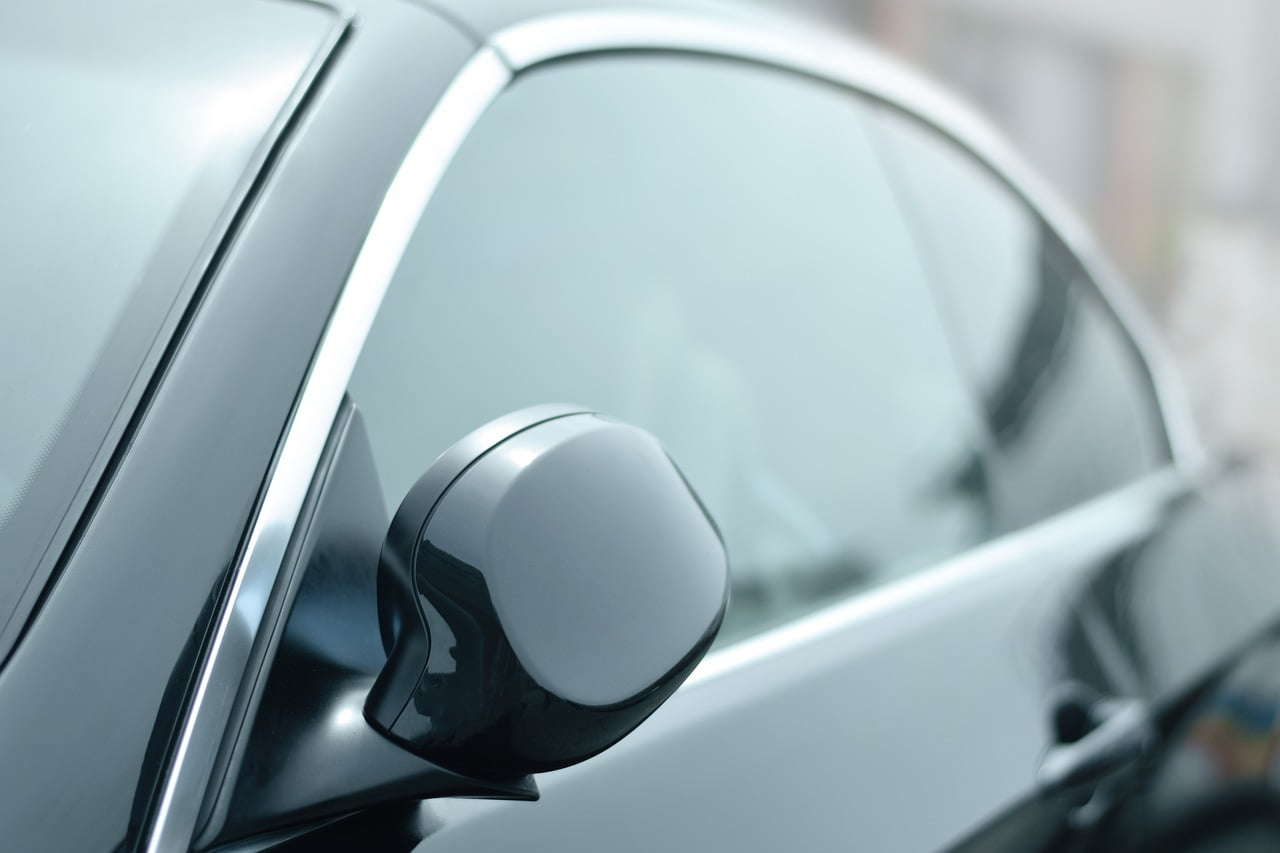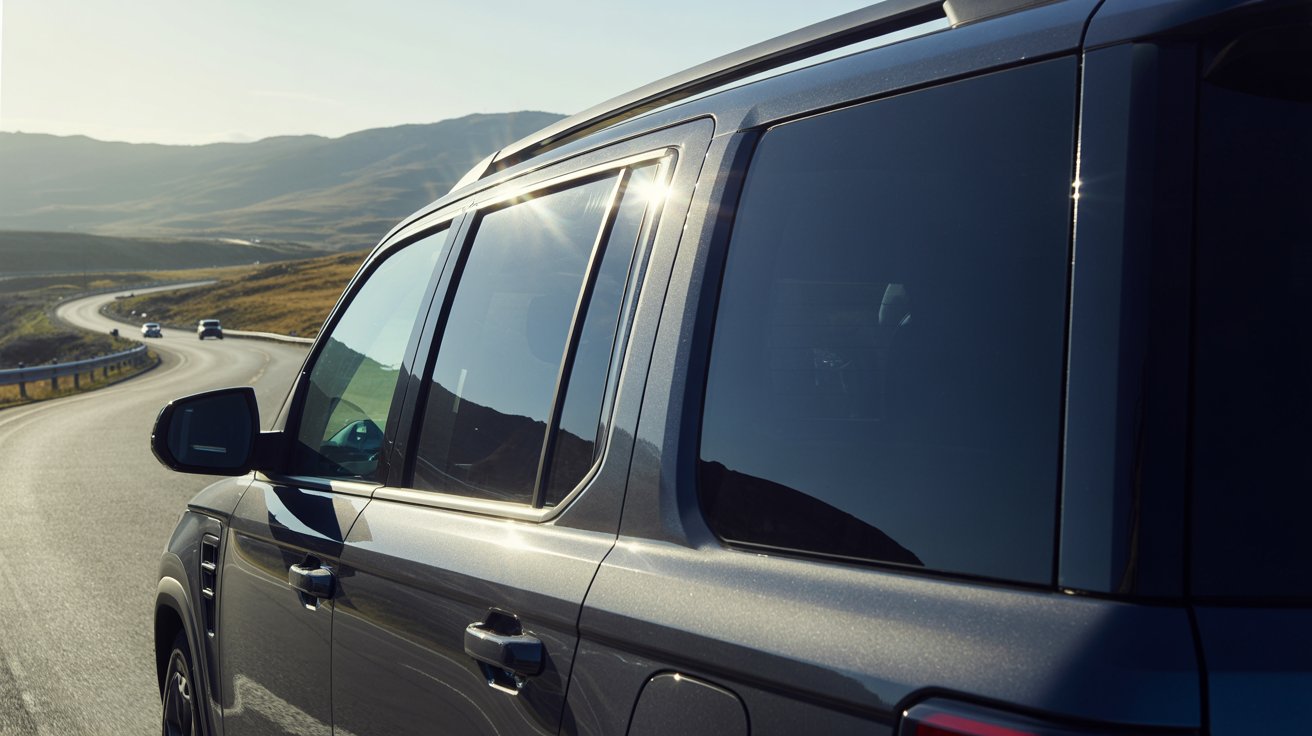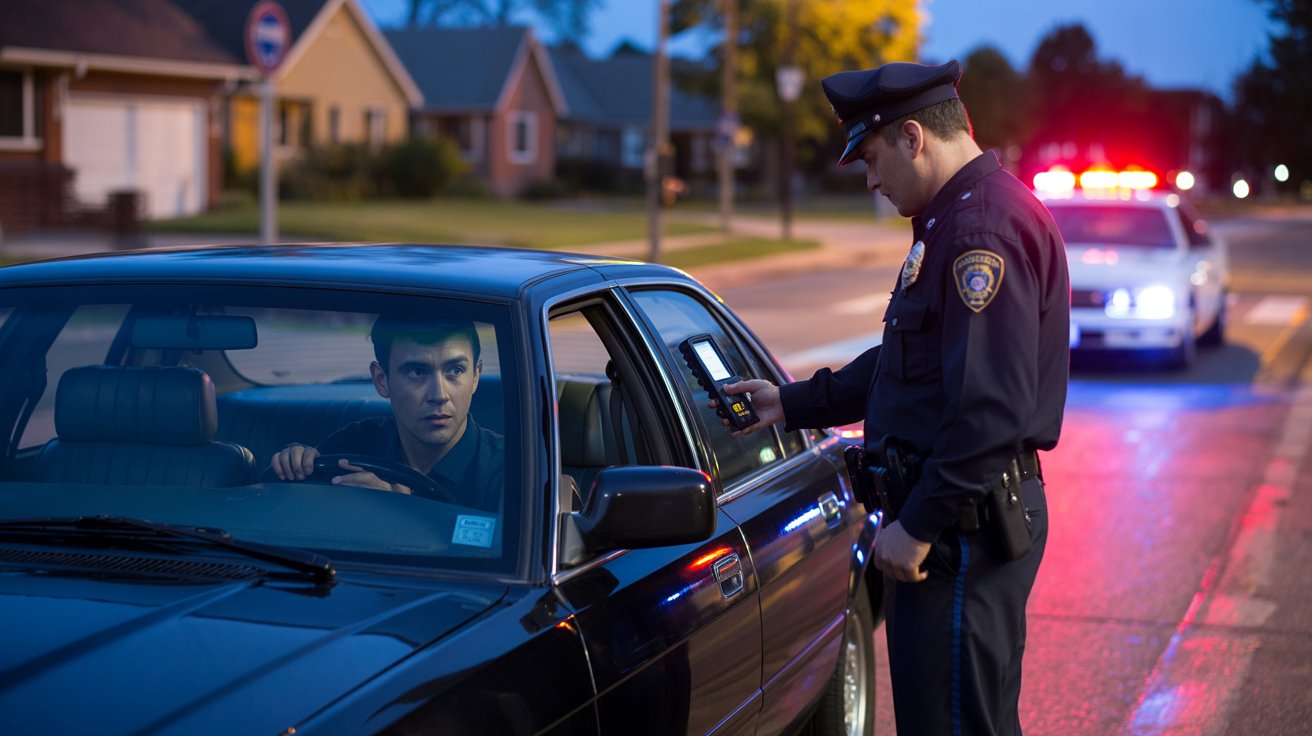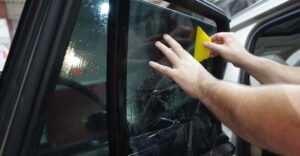Key Takeaways
- Colorado law requires at least 27% VLT (Visible Light Transmission) on front side windows and 70% VLT on windshields, with only non-reflective tint allowed on the top 4 inches
- Rear windows can have any darkness level (including 5% limo tint) as long as your vehicle has dual side mirrors installed
- Colorado does NOT recognize medical exemptions for darker window tint, despite common misconceptions
- Illegal window tint is a Class B traffic infraction with fines ranging from $500 to $5,000, and can escalate to a misdemeanor
- Having illegal tint during a car accident can increase your fault percentage under Colorado’s comparative negligence system, reducing your compensation

If you’re a Colorado driver considering window tint—or you’ve already been cited for illegal tint—you need to understand the state’s specific regulations. Window tinting offers real benefits: UV protection from Colorado’s intense high-altitude sun, heat rejection during summer drives, glare reduction on snowy I-25 and I-70 stretches, and privacy. But illegal tint can lead to expensive tickets, and more seriously, it can affect who’s found at fault if you’re involved in a car accident.
We break down Colorado’s motor vehicle window tint law in plain language, explains the penalties you face for violations, and addresses a critical question many drivers overlook: how illegal tint can impact your personal injury claim after a crash. Whether you’re researching tint options or dealing with a citation, this article gives you the clarity you need to make informed decisions and protect your legal rights.
What Is VLT and How Does Window Tinting Work?
Visible Light Transmission (VLT) is the percentage of visible light that passes through your vehicle’s windows. It’s the standard measurement used in Colorado Revised Statutes 42-4-227 to regulate window tint darkness.
Here’s how VLT works: a higher percentage means more light passes through (lighter tint), while a lower percentage means less light passes through (darker tint). For example, 70% VLT allows 70% of visible light to enter your vehicle, making the tint relatively light. In contrast, 5% VLT—often called “limo tint”—blocks 95% of visible light, creating an extremely dark appearance.
Window tint comes in two forms: factory tint (applied during manufacturing, usually light) and aftermarket tint (film applied after purchase). Both count toward your total VLT. If your vehicle has factory-tinted glass at 80% VLT and you add aftermarket film at 35% VLT, your combined VLT is approximately 28%—which barely meets Colorado’s legal requirement for front side windows.
Colorado Window Tint VLT Requirements by Window Type

Colorado law sets different VLT minimums depending on which window you’re tinting. Here’s what you need to know for each part of your vehicle:
Front Windshield
Colorado allows non-reflective tint only on the top 4 inches of your windshield, or down to the AS-1 line (a manufacturer marking etched into the glass, usually about 4-6 inches from the top). The tint in this strip must allow at least 70% VLT.
Tinting your entire front windshield is illegal in Colorado. This restriction exists for safety reasons: officers need to see drivers during traffic stops, and drivers need maximum visibility, especially during night driving or adverse weather on Colorado’s mountain highways.
Front Side Windows
Your driver and front passenger windows must allow more than 27% VLT. In practical terms, this means you cannot go darker than 27%—you need to stay at 28% or higher to comply with state law.
This is one of the strictest requirements in Colorado’s tint law because front side window visibility directly affects your ability to see pedestrians, cyclists, and vehicles approaching from the side, particularly at intersections or during lane changes.
Rear Side Windows and Rear Window
Colorado law is more permissive for rear windows. Any darkness level is allowed on rear side windows and the rear window of your vehicle—including 5% limo tint—as long as your vehicle has dual side mirrors (one on each side).
This rule applies to sedans, SUVs, trucks, and vans. The logic: if your rear visibility is obstructed by dark tint, you must compensate with properly functioning side mirrors that allow you to see traffic behind and beside you.
Key requirement: If you tint your rear window to any darkness level, dual side mirrors are mandatory. Driving without them when your rear window is tinted violates Colorado law and can result in a separate citation.
Prohibited Tints and Additional Restrictions
Beyond VLT percentages, Colorado law prohibits certain tint types and colors entirely:
- Mirrored or metallic tint is illegal. Colorado Revised Statutes 42-4-227 specifically bans any window material with a metallic or mirrored appearance. This includes highly reflective films that create a mirror-like finish on your windows.
- Red and amber tint colors are prohibited. These colors can be confused with emergency vehicle lighting or brake lights, creating safety hazards for other drivers and law enforcement.
- Reflective tint is restricted. While some reflection is unavoidable with certain films, Colorado law limits how reflective your tint can be. Non-reflective films are always the safest choice for compliance.
These restrictions exist to maintain visibility for law enforcement during traffic stops, ensure other drivers can see into your vehicle when necessary for safety (such as making eye contact at four-way stops), and prevent confusion with emergency vehicle markings.
Penalties for Illegal Window Tint in Colorado

Violating Colorado’s window tint law carries real consequences. Here’s what you’re facing if you’re caught with illegal tint:
Class B Traffic Infraction: Most window tint violations are classified as a Class B traffic infraction. While this is not a criminal offense, it comes with fines and a potential mark on your driving record.
Fines ranging from $500 to $5,000: The penalty for illegal tint can be substantial. First-time offenders typically face fines on the lower end of this range, but repeat violations or egregious cases (such as fully tinted windshields) can result in maximum penalties.
Misdemeanor escalation: In some cases, particularly if you’ve been cited multiple times or if your tint violation is combined with other offenses, the charge can escalate to a misdemeanor. This carries more serious legal consequences, including potential impacts on employment background checks.
Fix-it tickets and mandatory removal: Officers may issue a “fix-it” ticket requiring you to remove the illegal tint and provide proof of correction within a specified timeframe. Failure to comply can result in additional fines or vehicle impoundment in extreme cases.
Colorado law enforcement can pull you over specifically for window tint violations if an officer has reasonable suspicion that your tint is too dark. During the stop, officers use tint meters—handheld devices that measure VLT percentage by shining light through your window and calculating how much passes through. These measurements are generally accurate and admissible as evidence if you contest the citation.
How Illegal Window Tint Affects Car Accident Liability in Colorado
Here’s what many Colorado drivers don’t realize: illegal window tint can increase your fault percentage if you’re involved in a car accident, directly reducing the compensation you’re entitled to recover.
Colorado operates under a modified comparative negligence system. This means if you’re found partially at fault for an accident, your compensation is reduced by your percentage of fault. If you’re 50% or more at fault, you recover nothing.
How illegal tint factors into fault:
When you violate Colorado Revised Statutes 42-4-227 by having illegal window tint, you may be found negligent per se—meaning the violation itself is evidence of negligence. If the other party or their insurance company can argue that your illegal tint contributed to the accident (for example, by reducing your visibility when changing lanes, failing to see a pedestrian, or not noticing another vehicle approaching at an intersection), your fault percentage increases.
Real-world example: Imagine you’re involved in a collision at dusk on I-25. You have 15% VLT tint on your front side windows (illegal—should be 27% or higher). The other driver ran a red light, making them primarily at fault. However, their attorney argues that your illegal dark tint reduced your ability to see their vehicle approaching, and that you could have avoided the collision with legal tint. The court assigns you 30% fault. If your damages total $100,000, you now recover only $70,000 instead of the full amount.
This is where having an experienced Colorado personal injury lawyer matters. At Cheney Galluzzi & Howard, we’ve seen how insurance companies use illegal modifications—including window tint—to shift blame onto injured victims. We investigate every factor, challenge unfair fault assignments, and fight to ensure you’re not penalized more than the evidence supports. It’s more than money—it’s about justice and helping you rebuild your life after an accident.
Medical Exemptions for Window Tint: Myth vs. Reality in Colorado
One of the most common questions we hear is: “Can I get a medical exemption for darker window tint in Colorado?”
The answer is no. Colorado does not recognize medical exemptions for window tint.
Despite widespread confusion—and conflicting information on some websites—Colorado Revised Statutes 42-4-227 makes no provision for medical exemptions, even for drivers with photosensitivity, lupus, skin cancer history, or other conditions that make sun exposure dangerous.
Why the confusion? Many states, including neighboring New Mexico and Kansas, do allow medical exemptions with proper documentation from a physician. Drivers moving to Colorado from these states often assume the same rules apply. Additionally, some tint shops and online resources incorrectly claim that Colorado offers exemptions, leading to costly misunderstandings.
What this means for you: If you have a legitimate medical condition requiring protection from sunlight, you still must comply with Colorado’s VLT limits. Consider these legal alternatives:
- Use the maximum allowable tint (27% VLT on front side windows, any darkness on rear windows)
- Invest in high-quality UV-blocking film that meets legal VLT requirements but still blocks 99% of harmful UV rays
- Use sun-protective clothing, hats, and prescription sunglasses while driving
- Consult your physician about medical-grade window treatments for your home and workplace
Do not rely on a doctor’s note or “medical exemption certificate” as a defense if you’re cited for illegal tint in Colorado. The law does not recognize these documents, and you will still face penalties.
How to Stay Compliant with Colorado Window Tint Laws

Staying on the right side of Colorado’s tint laws requires a few practical steps:
Choose a reputable, Colorado-licensed tint installer. Professional shops understand state regulations and will refuse to install illegal tint. Ask to see the film’s VLT rating before installation and request documentation showing the exact percentage applied.
Verify your VLT before buying a used car. If you’re purchasing a vehicle with existing tint, have it tested with a tint meter before finalizing the sale. You’re responsible for compliance even if the previous owner installed illegal tint.
Understand that factory tint counts toward your VLT limit. Many newer vehicles come with light factory tint (usually 70-80% VLT). If you add aftermarket film, the combined VLT must still meet Colorado’s minimums. Ask your installer to calculate the total VLT before applying film.
Keep your tint documentation. Reputable installers provide certificates showing the VLT percentage of the film applied. Keep this in your vehicle in case you’re stopped and questioned about your tint darkness.
Install dual side mirrors if you tint your rear window. This is non-negotiable under Colorado law. If your vehicle doesn’t have factory dual mirrors, you’ll need to add them before tinting your rear window to any darkness level.
Injured in an Accident? We’re Here to Help
If you’ve been injured in a car accident in Colorado—especially if illegal window tint or other vehicle modifications are being used against you to shift fault—you need experienced legal representation that fights for your rights.
At Cheney Galluzzi & Howard, we’re Denver personal injury lawyers who understand Colorado traffic laws inside and out. We’ve helped hundreds of accident victims navigate complex liability issues in a car accident, challenge unfair fault assignments, and recover the compensation they deserve. We know how insurance companies use technical violations to reduce payouts, and we don’t let them get away with it.
You’re not just a case file. You’re a person who deserves to be heard and helped. We stand up to insurance companies, fight relentlessly for our clients, and care deeply about helping you put your life back together. It’s more than money—it’s justice.
We work on contingency, which means you don’t pay us unless we win. Your initial consultation is free, and we’ll give you honest guidance about your case, your rights, and your options.
If you’ve been hurt in a Colorado car accident and have questions about fault, liability, or how vehicle violations might affect your claim, contact Cheney Galluzzi & Howard today. Call our Denver office or schedule your free consultation online. Let us help you rebuild your life.
Frequently Asked Questions
Are there medical exemptions for darker window tint in Colorado?
No. Colorado does not recognize medical exemptions for window tint, regardless of medical conditions like photosensitivity, lupus, or skin cancer. Even with a doctor’s note, you must comply with Colorado’s VLT requirements: 27% minimum on front side windows and 70% minimum on windshields. Some states allow medical exemptions, but Colorado is not one of them.
What are the penalties for illegal window tint in Colorado?
Illegal window tint in Colorado is a Class B traffic infraction with fines ranging from $500 to $5,000. First-time violations typically result in lower fines, but repeat offenses or severe violations (like fully tinted windshields) can reach maximum penalties. In some cases, violations can escalate to misdemeanor charges. Officers may issue fix-it tickets requiring you to remove the illegal tint and provide proof of correction within a specified timeframe.
Can illegal window tint affect fault in a car accident?
Yes. Illegal window tint can increase your fault percentage under Colorado’s modified comparative negligence system. If your illegal tint reduced visibility and contributed to the accident, you may be found negligent per se—meaning the violation itself is evidence of negligence. This increases your fault percentage and reduces your compensation. For example, if you’re assigned 30% fault partly due to illegal tint, your $100,000 in damages drops to $70,000. Having an experienced personal injury attorney is critical to challenging unfair fault assignments.
How do police measure window tint during a traffic stop?
Colorado law enforcement officers use tint meters—handheld devices that measure VLT percentage by shining light through your window and calculating how much passes through. The officer places the meter against your window, and it provides an immediate digital reading of your VLT percentage. These measurements are generally accurate and admissible as evidence in court. Officers can pull you over specifically for suspected tint violations if they have reasonable suspicion your windows are too dark.
Is 5% “limo tint” legal on any windows in Colorado?
Yes, but only on rear side windows and the rear window. Colorado law allows any darkness level—including 5% limo tint—on rear windows, as long as your vehicle has dual side mirrors installed (one on each side). However, 5% tint is illegal on front side windows and windshields. Front side windows must be at least 27% VLT, and windshields can only have non-reflective tint on the top 4 inches at 70% VLT or lighter.
Do I need dual side mirrors if I tint my rear window?
Yes. Colorado law requires dual side mirrors (one on each side of your vehicle) if your rear window is tinted to any darkness level. This requirement ensures you can see traffic behind and beside you when your rear visibility is obstructed by dark tint. Driving without dual mirrors when your rear window is tinted violates Colorado Revised Statutes 42-4-227 and can result in a separate citation. Most vehicles come with dual mirrors from the factory, but verify before tinting your rear window.
What should I do if I receive a window tint ticket in Colorado?
If you receive a window tint citation, you have several options. First, verify the violation by having your tint professionally measured with a tint meter. If your tint is indeed illegal, remove it immediately to avoid additional penalties and show good faith if you contest the ticket. You can pay the fine and accept the citation, or contest it in court if you believe the measurement was inaccurate or the citation was issued in error. If you’re later involved in a car accident and illegal tint is used against you to increase fault, contact an experienced Colorado personal injury attorney immediately. We can help challenge unfair liability assignments and protect your right to compensation.


 Colorado State Moped & Scooter Laws – All You Need to Know
Colorado State Moped & Scooter Laws – All You Need to Know